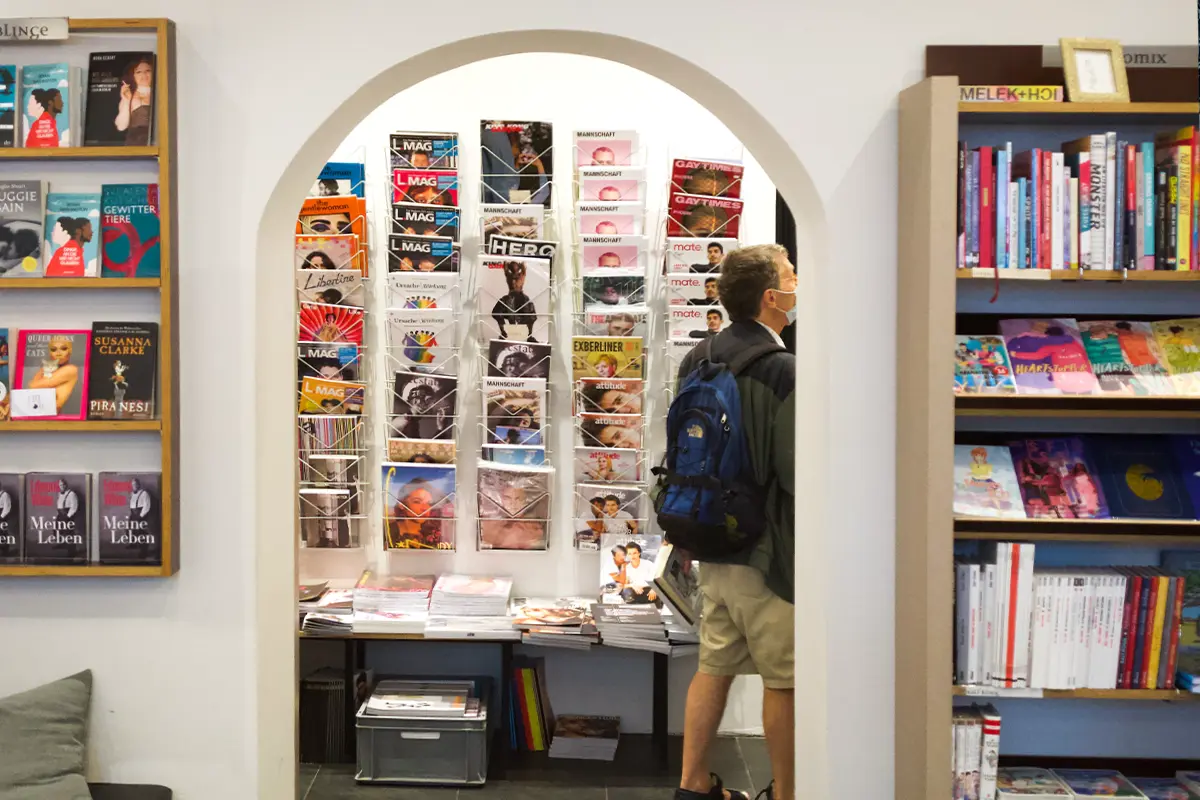A LGBTQ+ bookstore in the Berlin queer district of Schöneberg. Co-founder Roland Müller-Flashar on Eisenherz buchladen:«As long as discrimination persists, our bookstore must exist»
Eisenherz buchladen, a queer bookstore in Berlin born in the 1970s opposing to clandestinity
Eisenherz was established in 1978 in Berlin, emerging from the male gay and left-wing student movements of the late seventies. During a time of activism, a series of initiatives took root including the bookstore, a publishing house, and open coffee shops – a stark contrast to the era’s clandestine gay bars that required visitors to ring for entry.
The emergence of these openly visible spaces was a development compared to the previous situation. The driving force behind the creation of this bookstore was to bring to light gay literature and works by queer authors, not only for the self-identified gay community but for the public at large. As stated by one of the bookstore founders Roland Müller-Flashar: «Books have always represented a tool in the journey towards self-discovery and the understanding of one’s own identity».
Naming the bookstore – advocating for gay rights
«In Germany, one has to ensure everything is made official» explains Roland Müller-Flashar, recalling the time when his colleagues were required to visit the attorney to formalize the establishment of their bookstore. «The day preceding the notarial ratification, the quartet of founders found themselves in a pub, pondering over the potential name for the bookstore».
They came out with names including ‘Magnus Hirschfeld Buchhandlung’, referencing the German physician sexuality theorist who was an advocate of gay rights in the early 20th century, and ‘Klaus Mann bookstore’ in honor of the German author known for his novel that exposed the evil of the Nazi regime.
From Prinz Eisenherz to Eisenherz buchladen: shifting away from a perceived male dominance for inclusivity
Their brainstorming led them to Prinz Eisenherz a moniker that they found amusing in some way. This name alludes to Prince Valiant from the British Arthurian legend, surrounded by rumors of the character’s homosexuality. On occasion, the bookstore receives comic enthusiasts who are drawn in by the name alone. «It used to provide a touch of royalty too, whenever the phone rings» adds Roland Müller-Flashar.
However, with their second relocation from Bleibtreustrasse to Lietzenburger Strasse in 2004, the term ‘Prinz’ was dropped from the store’s name in an effort to appear more overtly queer and inclusive. The name change aimed to represent a shift away from a perceived male dominance, with ‘Prinz’ symbolizing the masculine element. «We also hired female staff to make it more diverse and inclusive. However, the name change did not garner much attention, even among the women and the queer people they sought to attract» claims Roland Müller-Flashar.
Nurturing young readership through magazines and fanzines at Eisenherz Berlin
Magazines play a role for Eisenherz as they draw in a younger demographic. The founders of the bookstore have the concern that the younger generation may be losing interest in reading books. Therefore, they keep striving to look for magazines and fanzines that will attract these young visitors to their store.
Moreover, their affection for fanzines is not merely business-driven; they have a personal affinity for them. They appreciate their unpolished nature, fostering an environment where ordinary people can feel at home. They also observe that many fanzines do not adopt conventional marketing strategies, which presents its own set of challenges. The quest to not only discover these publications, but also to acquire them, is a task in itself.
As regards the magazine selection, Eisenherz approach is a blend of following distribution recommendations and conducting independent research. At times, their customers will ask for specific names. If it is something they are not aware of, they will make efforts to find it and sell it in the bookstore. The founder explains how their selection also includes international publications: «I started with Butt magazine, and then there is Kink, Fluffer, Elska, and also Boys! Boys! Boys! from Britain».
Eisenherz’ customers embrace diversity, Roland Müller-Flashar: «People from all walks of life come through our doors»
The target customers comprise a blend of both residents and tourists, making it challenging to categorize them. However, this aspect is what brings Roland Müller-Flashar amusement at the store: «People from all walks of life come through our doors – from Berlin locals to young individuals exploring their identity in the queer community, and even long-time visitors who have been with us since the beginning. It is a mix of individuals from various backgrounds and experiences. Plus, the straight neighborhood, including those old ladies that we love».
Eisenherz bookstore, Berlin. Building connections through shared experiences: about sexual identity
Having spent thirty-five years in this line of work, Roland Müller-Flashar has become well-acquainted with some of the customers stories: «The bookstore is more than just a retail establishment; it also serves as a hub of information».
What sets this bookstore apart from others is its character. Those involved with it identify themselves around issues of sexuality, which provides a closer, more intimate connection than one might find in an ordinary bookstore, dealing primarily with sexual identity.
Roland Müller-Flashar acknowledges that the founders of the bookstore and their customers, for the most part, have traversed the journey of coming out, a path that is sometimes fraught with difficulties. This shared experience unites them, as they all have similar backgrounds. «We all understand each other’s experiences».
Eisenherz navigating through four decades and four locations in Berlin
Over the course of forty-five years, the bookstore has undergone four relocations. It all began not far from its current location in the late 70s, but that initial spot was small and lacked adequate heating. In the 80s, the store shifted to Charlottenburg, specifically around Savignyplatz, which was known as the former West Berlin bookstore area. If one were to consult old travel guides, they would discover a multitude of bookstores that have since disappeared. The move to this location in the early 80s marked a transformation for the bookstore. They operated there for nearly two decades.
Eisenherz relocation to Schöneberg, a gay district in Berlin
However, with the fall of the Berlin Wall, the usual dynamics changed, and the once-bustling Savignyplatz area became quiet overnight. Consequently, business experienced a decline. The owners made the decision to reach out to their customers. They relocated to Schöneberg, considered a queer district. However, Roland Müller-Flashar explains: «To be honest, it is more male dominated. I would describe it as a gay area. We aim at being more of a queer bookstore, but at least gay men are 60 or 70% of our customers. We moved in this area because we thought if the business does not work here, it will not work anywhere».
According to the co-founder , Eisenherzstands as the only one of their kind in Berlin’s Schöneberg: «She Said is yet another queer bookstore located in Berlin’s Kreuzberg, but its concept differs from ours». Other queer bookstores similar to ours exist in Stuttgart, in Southwest Germany, though there used to be more.
How Eisenherz Berlin represents a beacon of resilience, gathering the international members of the LGBTQ+ community
Roland Müller-Flashar enjoys engaging with customers from all around the world. These individuals hail from neighboring European countries, the German countryside, India, South Arabia, Ukraine, and even the former Soviet Union.
Interacting with a diverse clientele brings moments of joy, albeit with occasional painful instances. The bookstore is aware that the freedom they enjoy in Schöneberg is not a universal privilege; it stems from specific cultural, societal, and legal contexts that may not exist elsewhere.
«While strides have been made in securing rights and societal acceptance, we recognize that the political landscape elsewhere, such as in Poland and Russia, is witnessing a significant backlash. This is not only true for the LGBTQIA+ community but also for other marginalized groups. As long as discrimination persists, our bookstore must exist», explains Roland Müller-Flashar.
A gallery for niche exhibitions: Eisenherz’s room for representation of female, gay, and queer art
The bookstore has a gallery space where exhibitions change on a monthly basis. Eisenherz is not actively seeking artists; instead, artists usually approach them with requests. The aim is to have a more queer-focused gallery, explains the co-founder: «We are striving to make our gallery more inclusive and reserve space for female or queer artists instead of showcasing only gay art. Just recently, a discussion took place with a colleague about how next year’s schedule is already fully booked».
«Financially, it is a precarious balance. We would prefer to be in a position where we have sufficient funds to book more queer artists without worrying about sales. However, as long as we are reliant on the revenue from art sales, we must make careful decisions about which artists to feature. Regardless, we ensure to only feature art that we personally appreciate».
Eisenherz giving a space to international art: the works Slava Mogutin and his history as a gay immigrant
Roland Müller-Flashar appreciates diversity. «It is a mixture of known and unknown artists. We want to provide an avenue for all voices to be heard» he said. Just last month, Eisenherz hosted an exhibition by the German comic author Ralf König. Currently, they are presenting works by Musk Ming, a Chinese artist residing in Berlin. Ming merges traditional Chinese painting methods with modern techniques and Western aesthetics.
Another artist whose works have been exhibited at Eisenherz is Slava Mogutin. Born in the Soviet Union, Mogutin later immigrated to the U.S., making history as the first immigrant granted entry on the basis of his homosexuality.
Eisenherz embracing the future with optimism for a queer presence
«I believe it is still necessary for the store to be open here. As we look ahead, I yearn for a future where the queer community’s presence is stronger. Moreover, I am optimistic that people will continue to value reading despite the challenges posed by the digital revolution. Fortunately, the store’s efforts are paying off as people are returning once again. There was a period of quiet business, but now, a younger crowd is finding their way back, bringing a new energy to the space».
Eisenherz, Berlin
Motzstraße 23, 10777 Berlin. Eisenherz is a queer bookstore located in the area of Schöneberg, whose customers embrace diversity and community. The bookstore stands as a testament to the resilience and diversity of the queer community in Berlin.




















